PSHE
At EDClass, we understand the importance of educating pupils about personal, social, health and economic education. This can provide them with the tools to make responsible and informed decisions in their life. We have developed a PSHE curriculum with appropriate subject knowledge, skills and understanding to fulfil the requirements of the national curriculum.
The teaching and delivery of RSE & PSHE can help prepare pupils for the opportunities, responsibilities and experiences of adult life. This allows us to promote the spiritual, moral, social, cultural, mental and physical development of pupils, to facilitate their reintegration back into school and their wider community.
We are obligated to provide pupils with a high-quality, suitable and age-appropriate teaching of the subject to meet all of our learners’ needs. Pupils arrive at different stages throughout the academic year so some topics must be delivered again but differentiated to engage learning.
We aim to equip our pupils with the knowledge, life skills and understanding to support them through their reintegration back into school and their community, and to avoid the dangers and consequences of their actions.
In our personal, social and health education (PSHE) section, our content, which can be delivered in numerous ways such as timetabled, individual or personalised learning pathways, includes:
- A healthy diet for teenagers
- Accepting responsibility
- Alcohol
- Alcohol abuse
- Alcohol and mental health
- Alcohol and parenting
- Alcohol and relationships
- Alcohol and safe sex
- Alcohol withdrawal
- Alcoholism
- All about bulimia
- All about exclusion
- All about mindfulness
- Anxiety
- Are you suffering from post-traumatic stress disorder?
- Behaviour - Conduct Out in the Community
- Behaviour contract
- Belonging to a community
- Britain's drinking culture
- Building confidence and resilience
- Building Self-confidence and self-esteem
- Building Self-esteem - A practical guide for young people
- Bullying
- Bullying and social networking sites - Staying safe online
- Car crime
- Car crime and causes
- Care of the terminally ill
- Child Sexual Abuse (CSE)- Signs and indicators
- Child Sexual Exploitation (CSE)- Grooming
- Child Sexual Exploitation (CSE)- What is it?
- Children and fire
- Children and young people online and using mobile phones
- Children living in a digital world
- Citizens and communities
- Classifying foods using the traffic light system
- Conflicts affecting individuals and communities
- Consumers
- Consumers and suppliers
- Contacting the police - their response
- Contraception
- Controlling anger in the classroom
- Coping with conflict.
- Coping with disability
- Coping with multiculturalism
- Crime
- Crime in the local area
- Criminal convictions and their consequences
- Cyberbullying
- Dealing with anger in the classroom
- Dealing with Britain's alcohol problem.
- Defining Sexual Misconduct - Lewd behaviour SM4
- Democracy! What do you know?
- Developing self
- Dialling 999 - A practical guide for young people.
- Discipline
- Diversity
- Divorce and the impact on teenagers
- Drink driving
- Essential First Aid - A practical guide for young people
- Essential First Aid - A practical guide for young people. Lesson 2
- Every child matters
- Exam techniques and exam stress
- Excluded students
- Exploring democracy
- Female Genital Mutilation (FGM)
- Fire safety - Cooking
- Fire safety - Electrical items
- Fire safety - Planning an escape
- Fire safety - Smoke alarms
- Fire safety- candles, decorative lights and cigarettes
- Fire safety equipment for the home
- Forced Marriage - Student lesson
- Forms of government
- Groups in society
- Harassment and Bullying. How to deal with it.
- Harmful Sexual Behaviour - Student lesson
- Healthy eating - the benefits
- Healthy Lifestyle
- Healthy Living - Changing habits
- Healthy Living - Fruits and vegetables
- Healthy Living - Junk food
- Healthy relationships - Consent
- Healthy Sexual Relationships - Students Aged 13+ years Lesson
- Heroin
- HIV and AIDS
- Homelessness
- Honour Based Violence
- How are people influenced by celebrities?
- How are young people influenced by advertising?
- How do video games affect young people?
- How do you know if you've got a drink problem?
- How does peer pressure influence young people?
- Human Rights
- Human Rights, Dignity, Equality and Respect in the U.K.
- Human Trafficking - Student and parent lesson
- Identities
- Identity
- Individual rights and responsibilities.
- Inherited diseases
- 'It's good to talk.' Improving conversation and listening skills
- Justice system (Consequences)
- Justice system for young offenders
- Justice system for youth
- Juvenile crime
- Ketamine
- Laws
- Life processes
- Low-level disruption
- Marriage and family life
- Mental Health - Bulimia
- Mental health and well-being
- Mindfulness - everyone is doing it!
- Mindfulness walking
- Misuse of human rights
- Misuse of rights
- Modern slavery
- Morning mindfulness
- Parenting
- Pregnancy and fertility
- Prejudice and discrimination on grounds of gender or sex
- Puberty
- Puberty - Boys
- Puberty - Girls
- Puberty and growth into adulthood
- Racial Bullying and Harassment. How to deal with it
- Racism and the law
- Racism and the law revision lesson
- Relationships - Individually and groups
- Relationships
- Reproduction
- Reproduction: Human systems
- Reproduction: Foetus development
- Reproduction: The menstrual cycle
- Reproduction: The process of birth
- Resolution of conflict in school
- Respect
- Rest - The importance of resting
- Rewards and sanctions
- Right to vote
- Rights and responsibilities
- Rights and responsibilities of a citizen in a democracy
- Rights of individuals
- Romantic relationships
- Rules of a community
- Running away from home
- Self-esteem
- Self-harm
- Setting yourself goals
- Sexting
- Sexual abuse and exploitation
- Signs of drug abuse
- Smoking
- Stereotypes - Gender
- Stress and 'stress-busting'
- Take me to your leader
- The age of criminal responsibility
- The citizen and the law
- The impact of a student exclusion
- The justice system
- The laws in England and Northern Ireland
- The legal system and those involved
- The rights of parents and children
- The Samaritans
- The seriousness of exclusion
- The use and abuse of drugs
- The use of ASBOs in England and Northern Ireland - Two very different case studies
- The value of human life
- The youth justice system
- Tranquilizers - The health risks
- Truancy
- Types of Crime
- Underage drinking
- Understanding emotions: Anger
- Understanding emotions: Fear
- Understanding emotions: Sadness and depression
- Understanding emotions: Stress
- Understanding emotions: Self-esteem
- Understanding emotions: Self-image
- Using your vote
- Victim and witness support
- Victims of crime
- Voting
- Ways of contacting the police
- What are the health risks of alcohol abuse?
- What happens when someone goes missing?
- What influences people to drink alcohol?
- What is behaviour?
- What is peer pressure?
- Working as part of a group.
- Worldwide citizen
- Young offenders
- Young people and alcohol
- Young people and substances, alcohol and aerosols
- Young people and the media
- Youth court and magistrates court
Our PSHE Curriculum
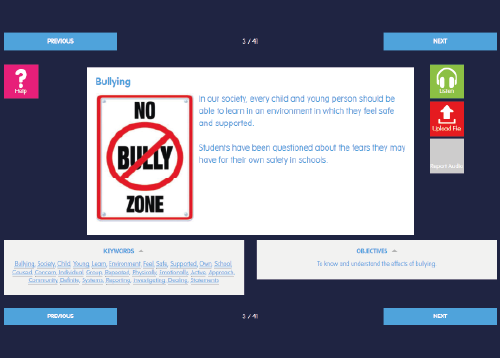 | 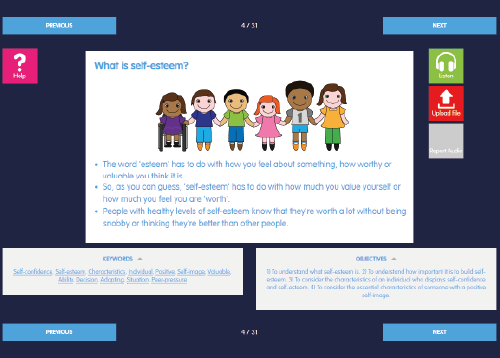 | 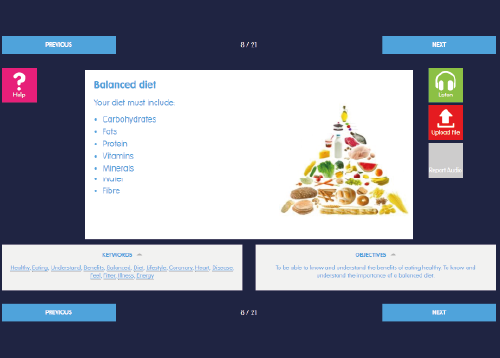 |
Games for Personal, Social, Health and Safety Skills
| Buck A Mood Topic: Mental health Players must learn to deal with the weight of the world on their shoulders, or rather, the donkey's shoulders! Thoughts and worries are piled on the cart one by one, and the player must respond before the worries get too much! Thoughts must be categorized into Financial worries, negative emotions, positive emotions and things to take action on. | |
| Bully Blast Topic: Anti-bullying Players are put in the role of a bully. In order to change their ways, they must use the letters they are given to spell the mystery word. If the word is completed, the player is stopped from being a bully! Every few words, there will be a bullying-related word, such as ‘Threaten’, ‘Abuse’ and ‘Racism’. This can spark open conversation amongst pupils, and eliminate the stigma around bullying. | |
| Channel It Topic: Mental health Channel It helps the player understand and categorize their emotions and gain an understanding of their mental health and well-being. They must drag and drop the emotions into different areas, too many wrong answers will cause them to lose their mind! | |
| Internet Safety Topic: Internet safety Positive and negative phrases are given to the player and they must choose whether to bin them or treasure them. The aim is to treasure the positive thoughts and bin the negative - some of which include common slang words that can often go overlooked in traditional bullying awareness lessons. | |
| Equal Flights Topic: Equality A versatile, introductory PSHE game that covers a range of hard-to-teach topics such as discrimination, radicalization and disability awareness. Players are asked a multiple-choice question and must throw a dart at the correct answer. You can choose a higher difficulty for the more confident students! | |
 | Infection Topic: Internet safety Players must sharpen their fast keyboard skills to protect their computers from viruses and malware. Some safe-looking files may glitch into viruses, showing how many dangers online are disguised. This game is a perfect game to engage students in competition with their peers and get them excited about e-safety! |
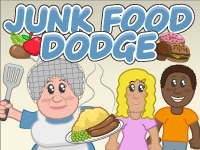 | Junk Food Dodge Topic: Healthy eating The player must identify healthy and unhealthy foods as they navigate through the school canteen. Bad choices will be detrimental to the player getting out of school on time. At the end of the game, the player will be given feedback on their performance and can compare scores with friends and family. |
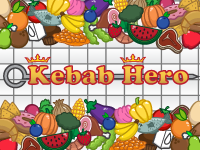 | Kebab Hero Topic: Healthy eating In Kebab Hero, players must follow the orders of the customers to make the correct kebab in time. Any incorrect orders will result in a point deduction, but a perfectly followed order will grant the player a tasty bonus! Players can see and learn about healthy and unhealthy foods around them in this fast-paced game. |
 | Knock Knock Topic: Stranger danger A brilliant game for teaching independence to children who may be, or are soon to be left at home alone. The parent figure will tell the player who is expected to be at the door. The player must then follow the procedure of using the door's lock-and-chain to check the identity of the visitor. They must then make the decision to let the person in, or keep the door closed. |
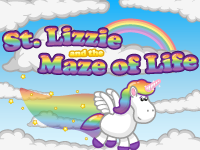 | St. Lizzie and the Maze of Life Topic: Manners In this game, players must navigate through mazes and collect coins as they do so. Often, they will encounter doors, which will only open when a question is answered correctly. The questions in this game revolve around manners and behaviour and is a perfect game to introduce KS1 pupils to manners and refine the understanding of manners for KS2 students and beyond. |
| Mountain of Aspiration Topic: Mental health Control Billy the goat in the hike to positive thinking! By using the arrow keys, players will navigate up the mountain, avoiding boulders with negative insults on them such as poor, crazy, gross and ugly. This game teaches players to always be resilient and understand the common words that can but should not, tear down their confidence. | |
| Nadia's Race Topic: Life skills Task your students to get in the right lane in this symbol identification game. With topics such as the weather and religion, players must identify the correct symbols and drive in the lane corresponding to the right answer. | |
| Pengo Topic: Life skills This fun game is great for generating competition in the classroom. Players must use their keyboard skills and understanding of physics to get the character as far through the level as possible. | |
| Rise Above It Topic: Mental Health Rise above it teaches players to be resilient and how to cope with tough and intimidating situations. When faced with a comment from another person, the player can choose whether to listen to or ignore the comment. Some of these are good, but some are bad, and this game gives pupils the opportunity to take initiative to respond to these comments in a safe space. | |
| Scrap It Topic: British Values Scrap It encourages pupils to identify key values of a British citizen and discard those that are dangerous, illegal or promote negative behaviour. Pupils will see these values written on the side of industrial barrels and must salvage the positive ones and scrap the negative ones. | |
| Search to Prevent Topic: Prevent This game tests the memory and spelling ability of the pupil, as well as their platforming skills! The pupil must navigate up a long tower, collecting letters as they go. At the top, the player is given five different PSHE words, such as ‘Democracy, Gangs, Resilience, Beliefs, and Liberty’. Then, the pupil must figure out which word can be made up of the letters they collected. This game can be great when played In teams. | |
| Social Skills Topic: Social skills The pupil is faced with a number of daunting yet realistic life situations regarding interactions with other people. The pupil must navigate their character to the door that represents their response. After each round, the correct answer will be revealed, with an explanation as to why it is correct. This game is well applied to pupils who may have just received their first smartphone or computer. | |
-0104210251.png) | Spellbound Topic: Internet safety Players are sent friend requests from different mythical web users. It is up to them to decide whether the requests are safe or too risky to accept. This game is excellent preparation for students who may have or want accounts on popular social media platforms. |
| Stranger Danger Topic: Stranger danger This game teaches players the potential dangers of being out alone and what people can be trusted. The player will be offered lifts from various people and they must use their initiative to decide whether they accept the lift or not. | |
| The Wisdom Tree Topic: Life skills Pupils are given words, acts and feelings on screen and must answer if what they see is ‘right’ or ‘wrong’. These questions are prompted by the wind blowing leaves into the player's path - if they do not responsibly clean them up, more questions will be asked of them, teaching them responsibility and well-being. | |
| Think Twice Topic: Internet safety This e-safety game teaches players about the potential dangers online and what they can do to avoid danger. They must collect the emails and open them, responding appropriately to what’s inside. A wrong answer will prompt an explanation of the scenario and why their decision was wrong. |
